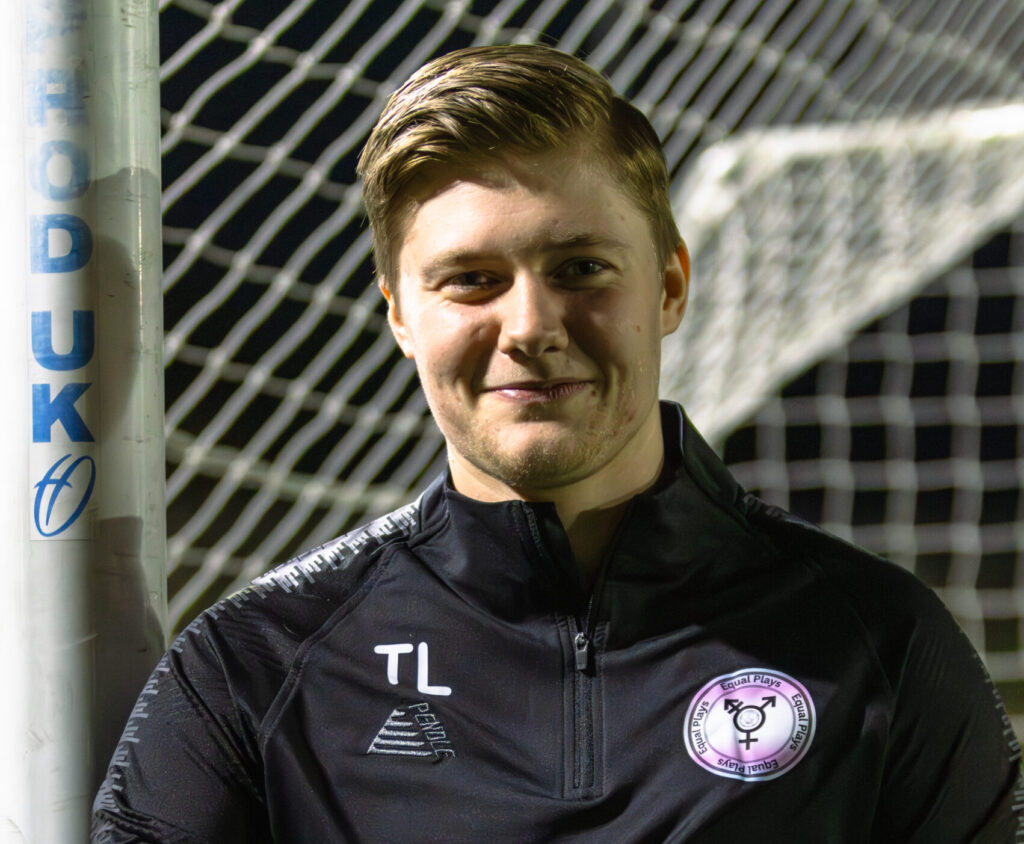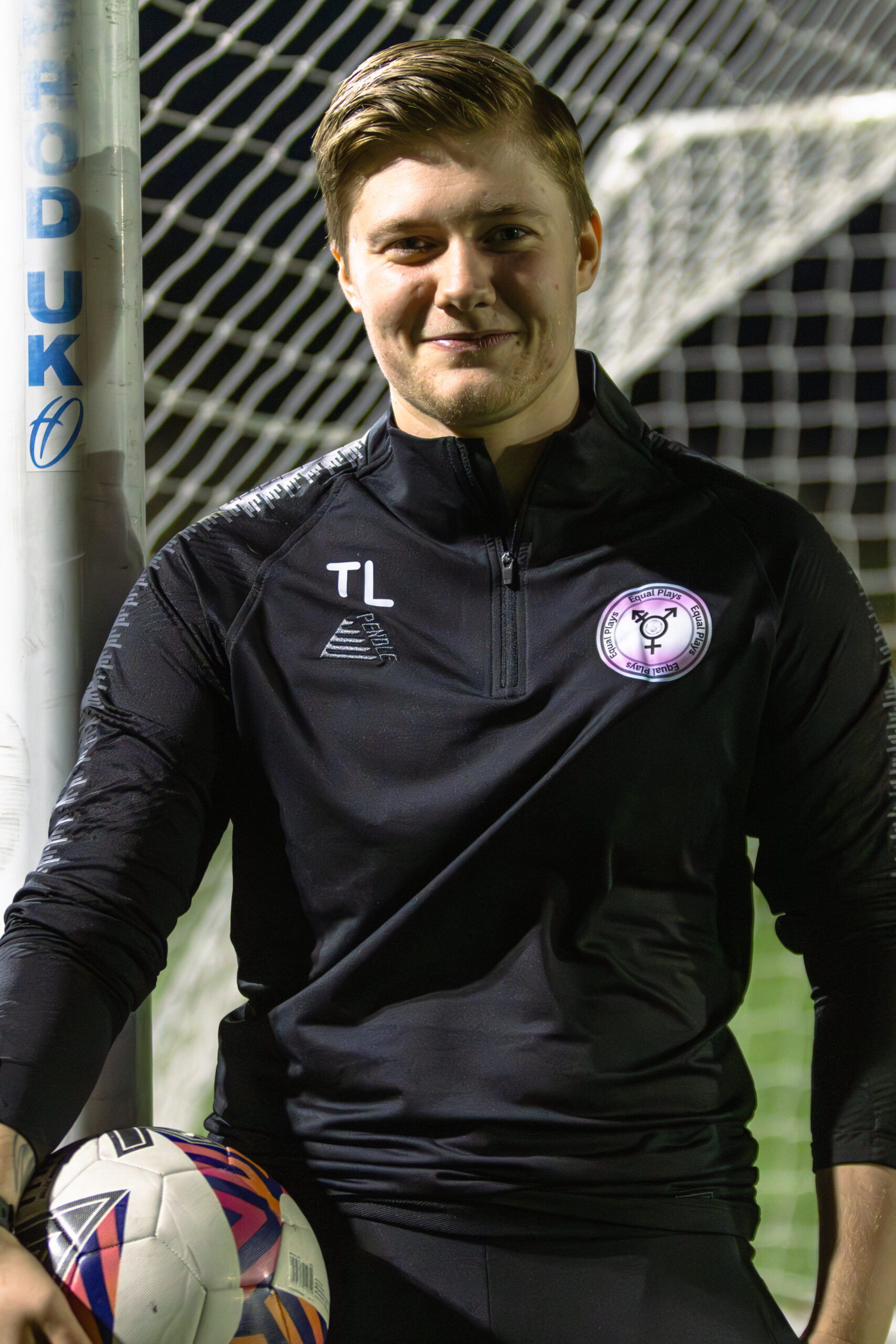Photography: Ellie Wright
“It’s amazing that I can sit here now and talk about my story so openly. I never expected to be able to say “this is who I am”. I am not afraid of it anymore,” says Tom Lamberth, aged 23, who came out as transgender at the age of 17.
Tom is launching a football project for transgender players this Thursday 28 March, to coincide with Transgender Visibility Day. It’ll take place at the Manchester Met sports centre at Platt Lane in Fallowfield, starting at 6pm with a social afterwards. The idea is to set up a safe space for transgender players to play football without having to meet FA rules. As part of that launch Tom sat down with me and explained his story.
Now a first year student on a Community Football Coaching BSc with Manchester City, Tom played football from a young age but gave it up at 16 to concentrate on his GCSEs. When he came back to the game, his whole world was changed.
“Around 16 I was toying with so many different ideas of who I was and what I was. I was really struggling with my mental health, and I said to my mum that I was on the verge of suicide. I really needed help. I went to the doctor and I came out in passing. She sat next to me and I was speaking to the doctor, and I said: “I’m a boy. I’ve always been a boy and I’ve really felt that.” We left, and my mum went ‘Ah, okay.’ She supported me the whole way through.
“I was petrified to accept being trans. I didn’t want to accept it because I didn’t know what the next step was after that. I think that was kind of what pushed me back: it was me, rather than any other external factor.
“How do I tell someone ‘This is who I am’ when I’m still confused? It was trying to establish that alongside everything else. It was a really huge juggling act, which I don’t think anyone sees unless they experience it. Trying to explain it to people is really difficult. People say: “I would have never have thought about that”… well, that’s because they don’t have to do it!”
Tom’s coming out story wasn’t a smooth one. Like many, he struggled to admit he felt different but throughout our interview, he says how happy and relieved he is to be able to talk about his journey.
“After coming out, I felt like a new person. I felt like I could breathe. I felt like I was seeing things clearly. I kept asking my mum what she would have called me if I was a boy. I was trying to find that footing of who I am and who I would have been if that had been me from the beginning. She’s the one who ended up picking my new name. I have that support and backing. If I didn’t have that I would really struggle, especially from a small town where everyone knows who you are.”
Having decided on who he was, Tom looked for a sport to play in his new life. Football wasn’t an option because of the FA’s rules on transgender players. He tried solo sports like boxing, cycling and running, but nothing gave him the same feeling as football.
“I had been playing football since primary school, all the way up until I was 16,” he says. “It was a massive part of my life. To then lose it instantly was a huge thing mentally.”
Tom described trying to find a football team inclusive of transgender people as feeling like ‘the other category’. Last summer, he joined the FA Leadership Academy and as part of his graduation project work created the programme ‘Equal Plays’, a transgender-inclusive safe space football session.
Growing up in Wiltshire limited Tom’s options to socialise with other people like him so he made the big decision to move to Manchester and set up his trans-football project here.
With many trans people being told they can’t play football due to rules and regulations that apply to the whole League structure, Tom wants his session to be a place where they can forget about all of that, and just enjoy having a kick-around.
He explained: “If you have a trans-only space, you don’t have to say “oh, by the way…”. You just have to say “my pronouns are” and everyone is just like “Ok, cool”. You don’t have to say your backstory. If you went to the FA with that, you would have to say: “This is who I am, this is how I was born, these are my hormones, etc” and you have to go through that deeper process. People don’t necessarily want to do that if they just want to be involved.
The first session for Equal Plays is on 28 March at the Platt Lane Sports Complex in Fallowfield, with the university football coaches enthusiastically backing his idea.
“I thought I would have to find funding from somewhere or someone, or some magic place that I would have to find with a magnifying glass! But no. They just said: “Here’s a space, come and use it.” I never would have expected to happen and having that connection is such an amazing thing.”
Tom is hoping that Thursday’s session will be the start of a whole new range of footballing opportunities for transgender players.
“If we get maybe 23 people, we could set up a team and see what leagues we fit into and where we can go,” he says. “It’s making those first steps to build a bigger picture.”







Leave a reply